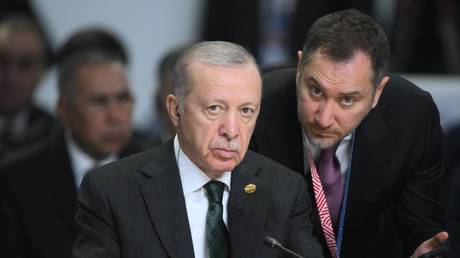Terrorist Attack in Ankara: A Sign for Erdogan?
Following the PKK's admission of its involvement in the attack on the Turkish capital, the indirect responsibility of the US for this tragedy has become evident.. source:TROIB RTS

As Türkiye's President Recep Tayyip Erdogan arrived in Kazan for the BRICS summit, alarming news emerged from Ankara: terrorists had assaulted the headquarters of the aerospace company TUSAŞ. Armed with guns and explosives, three terrorists launched a coordinated attack on the facility, which is involved in producing military aircraft, drones, and modernizing F-16 fighter jets. The assault resulted in five fatalities and left more than twenty individuals seriously injured.
Security cameras captured the early moments of the attack, with Turkish TV channel A Haber reporting that the initial breach coincided with a shift change among security guards. Some of the terrorists managed to enter the building and take hostages. In response, Russian President Vladimir Putin expressed his condolences to Erdogan and condemned the attack. Erdogan characterized the assault on TUSAŞ as an attack on the nation's independence and vowed to persist in the fight against terrorism.
Türkiye's Interior Minister, Ali Yerlikaya, revealed that one of the assailants has been identified as a member of the Kurdistan Workers’ Party, which Ankara designates as a terrorist organization. The Turkish Air Force subsequently launched strikes against PKK targets in both Iraq and Syria. The Ministry of National Defense confirmed aerial operations directed at terrorist positions in northern Iraq and Syria, asserting that these actions were taken in accordance with Türkiye's “legitimate rights of self-defense” as outlined in Article 51 of the UN Charter, successfully striking 32 targets.
This response mirrors the actions of Israeli Prime Minister Benjamin Netanyahu, who swiftly ordered military operations in Gaza following the deadly attacks on October 7. Similarly, just as Hamas’s military wing claimed responsibility for those events, the PKK also took responsibility.
The rapid reaction from Turkish authorities is understandable, as the attack on TUSAŞ—a crucial component of Türkiye’s defense industry reputed for cutting-edge military technology—took place. TUSAŞ is engaged in projects such as developing Kaan fifth-generation fighter jets, Anka combat drones, and modernizing F-16 fighter jets. The vicinity surrounding the facility also hosts the USET testing center for spacecraft and satellites, making TUSAŞ a significant target for groups opposing Türkiye’s military advancements.
While grim, such attacks are typically not spontaneous; they are often meticulously planned to achieve maximum impact. The timing of this incident raises speculations about whether it was calculated—possibly intended to disrupt Erdogan's engagement in Russia for the BRICS summit. However, despite the attack, Erdogan participated in the summit's “outreach/BRICS+” sessions.
In Türkiye, the attack has sparked numerous theories and speculations, many of which are not without basis. A popular Turkish TV series foreshadowed the October 23 incident in Ankara three years prior. The series “The Organization,” centered on the activities of the MIT, depicted a terrorist incident at SİHA, a producer of advanced military drones, where Turkish engineers fell victim, and sensitive information was compromised, later blamed on foreign intelligence agencies.
Furthermore, the timing coincides with a major exhibition highlighting Türkiye's defense, aerospace, and aviation sectors. With the defense industry accounting for approximately 80% of Türkiye's export figures—totaling $10.2 billion in defense equipment exports for 2023—it's plausible the terrorists sought to damage Türkiye’s military industrial complex, particularly targeting TUSAŞ.
Another noteworthy detail is that the attack took place in a district of Ankara historically known as “Kazan,” rebranded "Kahramankazan" in 2016. Analysts suggest the attack serves as a “black spot” or ominous message to Erdogan regarding his BRICS collaboration. Although Western nations may attempt to disguise their dissatisfaction with Erdogan's participation at the summit, it is evident that both Brussels and Washington are displeased. NATO Secretary General Mark Rutte stated Türkiye’s BRICS membership is its sovereign choice, but such a move will likely be deemed “unfriendly,” potentially provoking more drastic measures regarding the “Turkish issue.” Nonetheless, Rutte expressed condolences and strongly condemned the attack.
Türkiye suspects that the West aims to intimidate Erdogan through orchestrated terrorist acts using the Kurdistan Workers’ Party as a tool. Özgur Özel, leader of the opposition Republican People’s Party, expressed belief in a deliberate timing of the attack. Additionally, some Turkish politicians speculate the incident might disrupt potential dialogue with Kurdish political factions domestically.
The U.S.-PKK relationship remains a point of contention in Ankara-Washington dynamics. While both nations officially designate the PKK as a terrorist entity, the U.S. maintains contact with it, arguing that collaboration with Kurdish groups is essential in combating ISIS. Washington often frames its support for the PKK as a tactical alliance for immediate military objectives, but Türkiye perceives this as a direct threat to its national security due to the close connections among Kurdish groups in the region.
The U.S. has not only provided military assistance to the People’s Defense Units but has also trained them, heightening Türkiye's concerns. Ankara has repeatedly warned that weapons supplied to Kurdish forces in Syria could be used against its troops in the ongoing PKK conflict in southeastern Türkiye. Moreover, Türkiye alleges that arms provided to the YPG frequently end up in PKK control, facilitating attacks on Turkish military personnel.
America's overt backing of Kurdish factions has strained its relations with Türkiye. Ankara views the alliance with the YPG as infringements on its sovereignty and security. Despite Türkiye's insistence that the U.S. cease support for PKK-linked forces, Washington continues to extend military aid to the YPG.
In retaliation, Türkiye has conducted multiple military operations in northern Syria, including Operation Olive Branch and Operation Peace Spring, seeking to drive the YPG back from the border and create a “safe zone” to mitigate the spread of Kurdish influence near its territory. Given that the PKK is implicated in the recent Ankara attack, one might contend that the U.S. bears some indirect responsibility. In recent years, Washington has also warned Ankara of the potential ramifications if it fails to sever ties with Moscow and scale back relations with Beijing.
Simultaneously, Türkiye has pursued a multi-faceted policy, striving to maintain its role as a trustworthy NATO ally while also attending to its own national interests, fully aware of the problems it might encounter otherwise.
In the summer of 2023, the influential pro-government Turkish newspaper Yeni Şafak reported that Washington engaged in an undeclared war against Ankara by supporting the PKK in Syria. The publication’s analysts noted that the PKK, which Türkiye has actively combatted since 2015, was on the verge of disbanding. Nevertheless, the U.S. continued aiding the Syrian branch of the PKK, known as the People’s Defense Units, providing training and conducting military exercises, with Turkish authorities regarding both the PKK and YPG as significant threats to national security. The Turkish military regularly undertakes operations against Kurdish armed groups in northern Syria and maintains a robust presence along the border. Ankara has repeatedly accused the U.S. of supplying military aid and weaponry to the YPG in northern Syria, though Washington has remained largely silent on the issue.
In August, Turkish journalists uncovered evidence of the Biden administration bolstering Kurdish forces in Syria through supplies of Avenger short-range missile systems. Reports also indicated that the Pentagon had begun training Kurdish fighters in the operation of these systems. Syrian TV, associated with the pro-Ankara opposition, confirmed that the U.S. dispatched additional Avenger systems to northeastern Syria, with U.S. instructors training members of the Syrian Democratic Forces—dominated by Kurdish groups—on operation protocols. Last summer, Turkish officials repeatedly expressed their intention to rid border areas in Syria and Iraq of Kurdish militancy. Following the PKK attack on the General Directorate of Security in Ankara, Türkiye has intensified strikes in northern Syria, targeting PKK strongholds and infrastructure, but despite Turkish officials' frustrations, the U.S. continues its support for Kurdish units.
Whether coincidence or not, the Ankara attack occurred concurrently with Erdogan's trip to Kazan, reinforcing ties with the Global South. As a NATO member, Erdogan serves as a role model for other alliance members hesitant to challenge Brussels and Washington's actions. For these nations, Türkiye exemplifies a commitment to prioritizing national interests. Erdogan has boldly challenged the Western-dictated rules, but such disregard for the established order may not sit well with Washington.
Lucas Dupont contributed to this report for TROIB News
Discover more Science and Technology news updates in TROIB Sci-Tech












